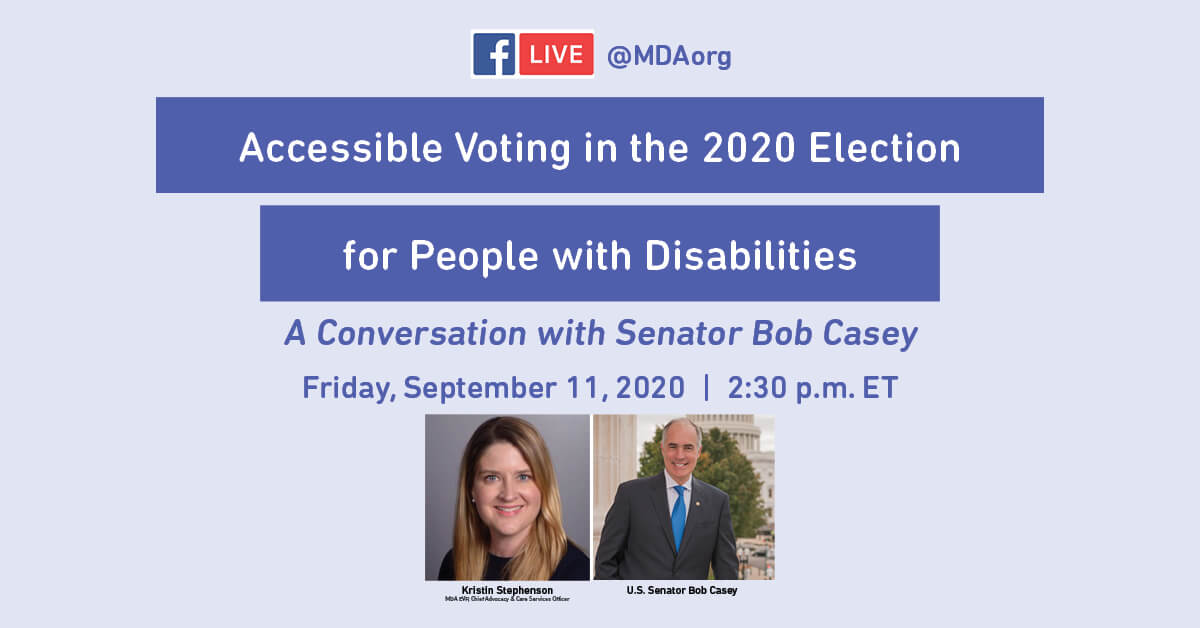
About Us
MDA Advocacy Institute - Facebook Live - Q&A: Accessible Voting in the 2020 Election for People with Disabilities -- Featuring U.S. Senator Bob Casey, Hosted by MDA's Kristin Stephenson, Friday, September 11 at 2:30pm ET
NEW YORK, Sept. 1, 2020
What:
The Muscular Dystrophy Association's (MDA) Advocacy Institute invites you to join a special virtual conversation on Facebook Live featuring U.S. Senator Bob Casey, to inform the needs of the MDA community in accessible voting in the 2020 election and beyond. Sen. Casey, a longtime ally of the disability community and sponsor of the Accessible Voting Act (S. 3206), will be joined by MDA's Kristin Stephenson to discuss the rights of all individuals to cast their ballots this election, including those living with disabilities and neuromuscular diseases.
"The right to vote is one of the fundamental pillars of American democracy. It is critical that all Americans, regardless of their health or disability status, be able to cast their ballot in every election" said Senator Casey. "The Accessible Voting Act would ensure the full process of voting—from registering to vote, to casting a ballot in person or by mail—is open and accessible for everyone. I am pleased to join MDA in their work to educate Americans about their rights when voting – whether by mail or at the ballot box."

The conversation aims to provide answers, resources and ways families living with neuromuscular disease can advocate for accessible voting and vote in their own communities in the 2020 election.
The duo will answer questions and discuss the Accessible Voting Act and voting during the pandemic for people with disabilities, including:
- Support and obstacles to passage of the Accessible Voting Act
- Guidance on voting in the 2020 election for people with disabilities including https://www.healthyvoting.org/
- Importance of advocacy and ways to engage at https://www.mda.org/get-involved/advocacy
- MDA guidance for the neuromuscular community during the pandemic at https://www.mda.org/covid19
The Facebook Live event is open to all audiences and will be posted following the event on Facebook@MDAorg, YouTube.com/MDA, mda.org/Advocacy and mda.org/updates.
When:
Friday, September 11 at 2:30 p.m. ET
Where:
MDA will request questions from the community in forthcoming posts on the @MDAorg Facebook page.
Who:
** panelists available for interview prior to, or following, Q&A**
- U.S. Senator Bob Casey: Bob Casey believes that "all public service is a trust, given in faith and accepted in honor." Since he was elected to the United States Senate in 2006, he has worked to create family sustaining jobs and foster financial security for Pennsylvania families; protect our children and invest in their futures; ensure safety at home and respect for America abroad; promote honesty and accountability in government; preserve the dignity of the vulnerable of all ages among us; and advocate for his constituents and help them solve problems they face.
- Kristin Stephenson, MHA, J.D.: Stephenson is the Executive Vice President, Chief Advocacy & Care Services Officer for Muscular Dystrophy Association. She oversees MDA's Care & Clinical Services Division, which includes MDA's Care Center Network, National Resource Center, and MDA's nationwide Care & Clinical Services field team. She also leads MDA's Public Policy & Advocacy Department.
Why:
Those in the neuromuscular disease community (including muscular dystrophy, CMD, SMA, Duchenne and related diseases such as ALS (aka Lou Gehrig's disease)) are among people with disabilities living in the United States who deserve accessible voting in all elections. This conversation and Q&A aim to educate advocates on the resources available to them to cast their ballots this election. MDA continues to be on the frontlines serving the neuromuscular diseases community with resources, care, advocacy and research for over 250,000 people in the United States.
About the Accessible Voting Act
Why do we need the Accessible Voting Act? Almost a quarter of the electorate will be 65 years old or older in 2020, and an estimated 14.3 million citizens with disabilities reported voting in November 2018. The National Congress of American Indians found that the turnout rate for Native Americans and Alaska Native registered voters is between 5 to 14 percent lower than turnout rates of other racial and ethnic groups. There are nearly 26,000,000 individuals in the United States with limited English proficiency. These communities represent a large part of the electorate, but their voting needs are often overlooked and misunderstood. Despite federal laws requiring fully accessible voting places, barriers for people with disabilities and older adults still exist.
About the Muscular Dystrophy Association
For 70 years, the Muscular Dystrophy Association (MDA) has been committed to transforming the lives of people affected by muscular dystrophy, ALS, and related neuromuscular diseases. We do this through innovations in science and innovations in care. As the largest source of funding for neuromuscular disease research outside of the federal government, MDA has committed more than $1 billion since our inception to accelerate the discovery of therapies and cures. Research we have supported is directly linked to life-changing therapies across multiple neuromuscular diseases. MDA's MOVR is the first and only data hub that aggregates clinical, genetic, and patient-reported data for multiple neuromuscular diseases to improve health outcomes and accelerate drug development. MDA supports the largest network of multidisciplinary clinics providing best in class care at more than 150 of the nation's top medical institutions. Our Resource Center serves the community with one-on-one specialized support, and we offer educational conferences, events, and materials for families and healthcare providers. Each year thousands of children and young adults learn vital life skills and gain independence at summer camp and through recreational programs, at no cost to families. During the COVID-19 pandemic, MDA continues to produce virtual events and programming to support our community when in-person events and activities are not possible, including virtual summer camp. MDA's COVID-19 guidelines and virtual events are posted at mda.org/COVID19. For more information, visit mda.org.
SOURCE Muscular Dystrophy Association